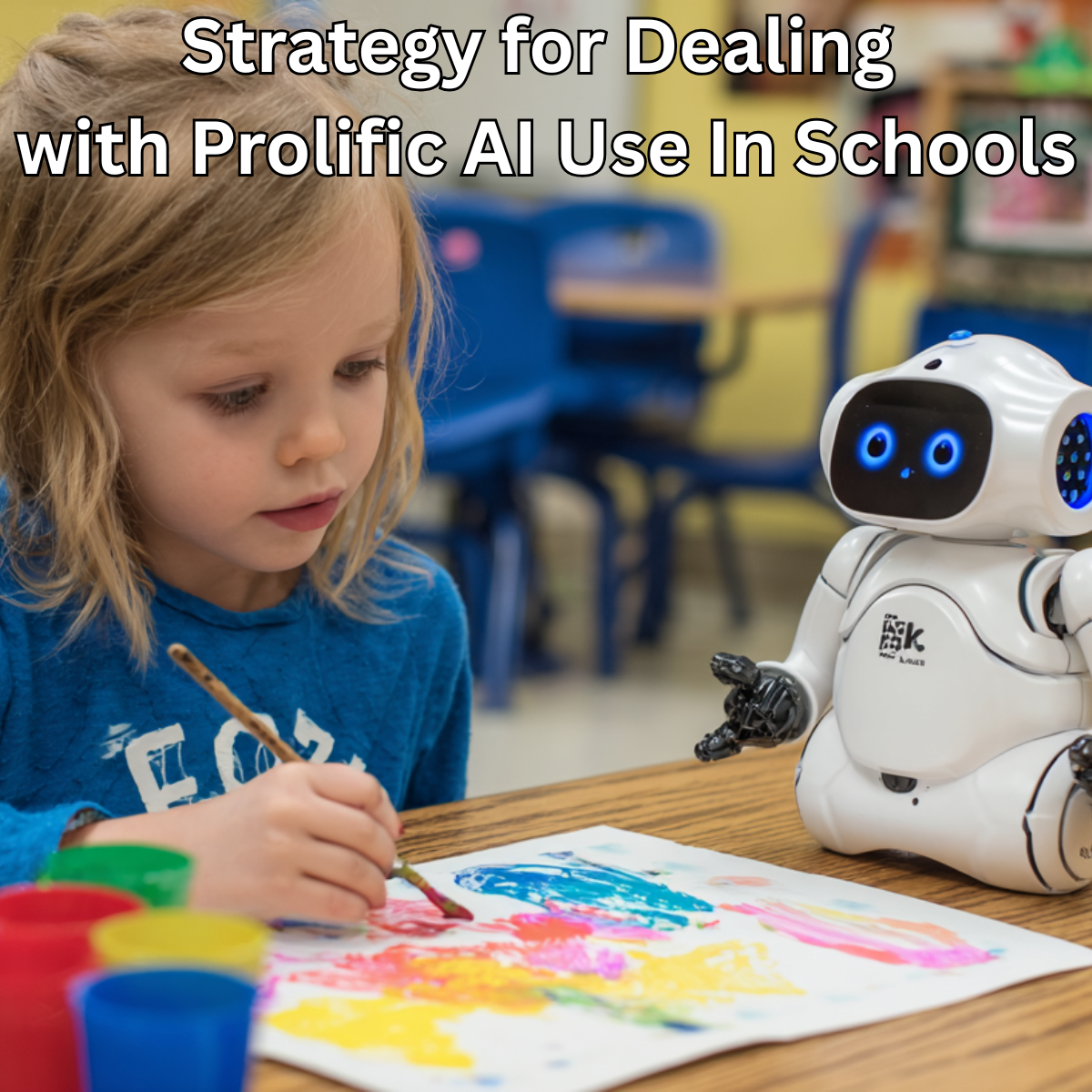In a parent-teacher conference, I heard a teacher comment that she did not allow the kids to use AI for their work. When asked how she policed that, she stated that she used an AI detection tool. I chuckled and decided to let it go. This poor woman has no idea. I could name at least twenty tools that would allow a kid to convert their AI derived text into a result that would pass a detection tool. As a consequence, many teachers have resorted to essay writing in class. That means they bring in that ancient torture device from when I was a child, called a “blue book,” and the students write their essay in class under supervision. I suppose that is one way to attempt to thwart the rapid proliferation of AI tools in our classrooms.
I talked with someone who works in a school district IT operation. They are investing in firewall technology that can block AI tools, and they are adopting new policies and lockboxes for phones so that they can prevent young people from using AI in the classroom setting. Interesting. Prolific social media use seemed okay, but now that someone can use a tool that helps them accomplish their work, we have to lock them down. Interesting. I am not sure what social commentary we can derive from that, but it does not look good for us. We are perfectly okay with our teenagers running around yelling six, seven, and acting like fools, but use a tool that can access the entire corpus of human knowledge? Nope. Lock them down.
I think I have a better idea. First, just dramatically increase the workload. Shocking? Hear me out. If everyone is going to be using AI tools to do work, then why not embrace that idea and give them more work to do? Is that not what is going to happen in real life anyway? A developer showed me a few weeks ago how they could instantly and easily create a new website using a Vibe coding tool. I thought, wow, that was easy. They said, it sure was, and it works too. Well, if that is the case, make me fifty new landing pages with unique domain pages, full content, and the ability to register and gain subscribers by Friday. The developer looked at me with a blank expression. That is a lot of work, he said. Exactly, I replied.
This is what is going to happen in the next ten years; it is the same thing that happened in the mid-1960s. Mainframes dramatically increased the amount of work that one clerical or payroll staff member could get done in a day. Not long after, entire branches and divisions were wiped out. In the mid-1990s, the Personal Computer and the Internet seriously improved the amount of work that everyday workers could accomplish in a business setting. We did not give them more time off; instead we fired their colleagues, bought out the failing companies that did not keep up, and then asked those task workers to do ten times what they were doing before. This is exactly what should happen in the school system.
Now, I will pause here. Maybe we as a society should take a collective sigh of relief and say, wow, we have created technology that is going to place fewer demands on us as humans, so perhaps we should reduce the work week to three days, give people more time to enjoy life, be creative, and spend time with loved ones and family. Nah. We are not going to do that; we are going to do the opposite. That is what we always do. We are a thriving anthill, and we are going to continue to behave that way until we go extinct, probably, so we might as well embrace it. Instead of sticking our heads in the sand and crying foul and pretending we can prevent a smart kid with a smartphone from using AI, we should just say, Alright, use your AI, but here is your new workload. Have fun. Because if you want to do something other than drive the last remaining forklifts that are not autonomous, then you’d better get used to it.
Another possible path is to make the problem set significantly more difficult. What do you say. The kids can barely handle basic algebra, and now we are going to make the assignments more difficult. Precisely. There is going to come a time, and I think we are rapidly approaching that time, when the fundamentals are no longer feasible to teach. It is like teaching an IT worker what binary is. I could spend a ton of time teaching a young person binary, hex, and basic numbering systems, but at some point you have to wonder why. When I was young, I learned to build a compiler in computer science classes. That was a great thing to learn back then, because we were just barely getting to the point where we had languages like Java that could compile on demand. But nowadays, I do not have the time to teach someone the basics of compiling, much less C or another fundamental language. Why teach someone how to manage memory in a PC, when the very concept of memory and storage is going to be nonexistent in the next few years? The same goes for math. There will be a time, in the not-too-distant future, when we just cannot afford to wait fifteen to twenty years for a young person to learn all the fundamentals before they can become productive. We are going to want them to start being productive at a much higher level when they leave the school system.
So make the problem domain harder. That is the potential answer. An instructor could use AI tools to construct a problem domain that is sufficiently difficult that even someone using AI would struggle to solve it. In fact, using AI would be required to get even close to a solution, because the complexity is far greater than a single person could solve on their own. When I was in high school, I had to write an essay on The Great Gatsby. The teacher wanted me to reflect on what she felt was the intent of Fitzgerald, to criticize the concept of the American Dream. If you were to ask an LLM today to do the same essay, it would spit out the perfect draft that parroted exactly what that English teacher wanted back then. There have been so many essays written on this topic that an LLM would have little trouble predicting the exact combination of words that would produce the desired result.
I, being the rebel without a clue, took a completely different spin. I wrote an essay on how teachers in modern schools were teaching children to glorify alcoholics and drug addicts. They encouraged us to hold in high esteem people like Hemingway, F. Scott Fitzgerald, and T. S. Eliot. People who were addicted to substances, struggled in life, never held down a marriage, and had early deaths due to their lifestyle. I got an F, and I was required to have a parent meeting after school to discuss my dissident behavior. How dare I ridicule the great artistic and literary genius of F. Scott Fitzgerald? However, with the advent of AI tools, we may now actually be rewarding this behavior. Instead of looking for kids who can parrot back the talking points of our discipline, perhaps we are now looking for people who can challenge and disrupt the parameters by which our new thinking models are built. Is that the new marketable skill?
So imagine a literature class in high school introducing a photocopy of a medieval text held at the National Library of Russian Manuscripts. Welcome to class, students, this fine Monday morning. On the wall is an image of an ancient Russian manuscript. Due on Friday is a complete essay that compares the angst of this ancient writer, who lived in an Eastern Orthodox Monastery, to that of F. Scott Fitzgerald and his failed Hollywood career after he attempted to market The Great Gatsby. You will need to take a picture of it, translate it, and determine the history, meaning, and context of the original writer. You will then need to analyze and study the life of F. Scott Fitzgerald after his climb to fame. What went wrong with his career, and why? Determine what relevance this time period in the United States had with the further decay of religious influence in Russian urban areas. Can you draw any conclusions? How do you defend those conclusions? What does this say about where we are heading as a society today? Good luck with the assignment. Use whatever AI tools you want, and if you need any help, let me know.
This is not an assignment that any AI tool could do. You could collect pieces, stitch them together, and then ask AI to help you collate them. However, this is not a topic that any model has been trained on at all, and the potential for hallucinations is significant, not to mention that there is little to no training data on Russian medieval literature in any LLM that I could find. This exercise would force a higher level of synthesis, which many would argue is doctoral-level. I laugh at that, because let us be honest. On these stale topics, like the literary greatness of F. Scott Fitzgerald, AI tools are far more capable than ninety-nine percent of humans on this topic. So perhaps it is time to demand more of our young people. They have a human brain that is highly capable and incredibly efficient, especially when they are young. Maybe it is time to force them to actually use it. The only way we are going to produce engineers, scientists, authors, and researchers who can break new boundaries is by getting them started younger and getting them comfortable with using tools that will rapidly extend and magnify their capabilities.
The ship has sailed. We decided as a society that it was perfectly acceptable to hand our children small digital devices that allowed them to communicate with the entire world. So now we are stupefied that these young people are using modern AI tools to create memes, AI videos, and silly fakes of their friends in compromising situations. They have access to everything from their phones already, and all of these are easily accessible with a social media login, so the ship has not only sailed, it is long gone and past the horizon. We created this monster, so perhaps instead of trying to slow it down with tactics that are not going to work, we should just exponentially increase the sophistication and quantity of what is required. Of course, this will lead to an even wider gap between those who have access to this technology and those who do not, but that is a topic for another day.




